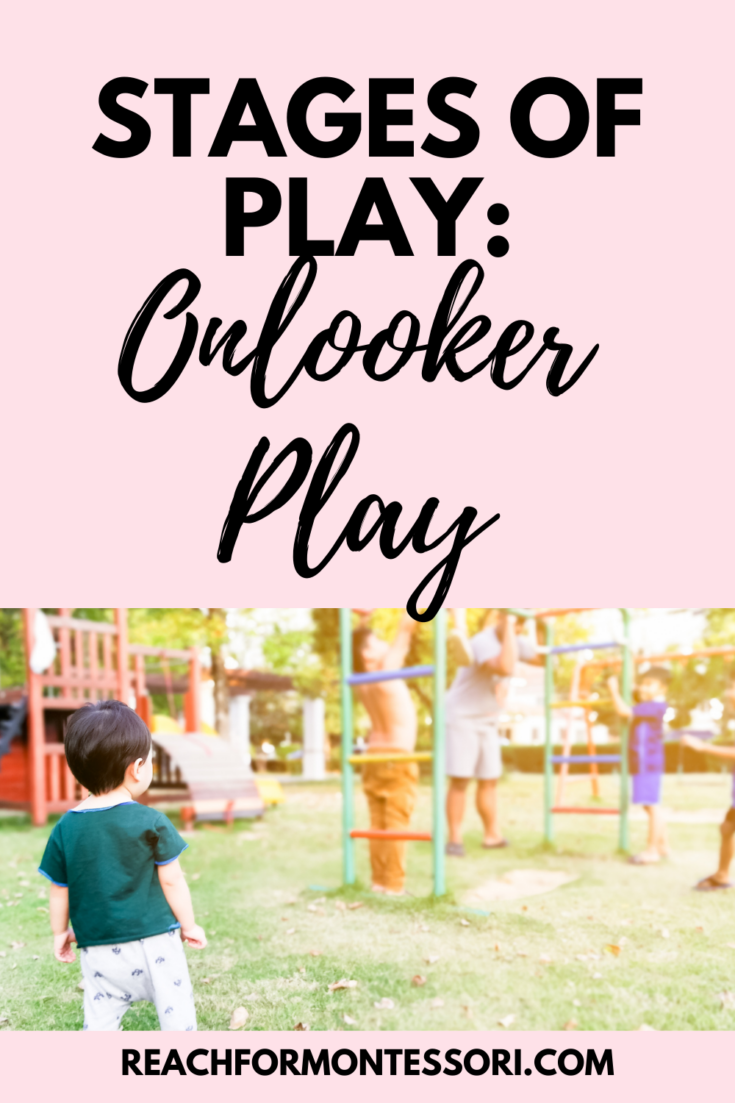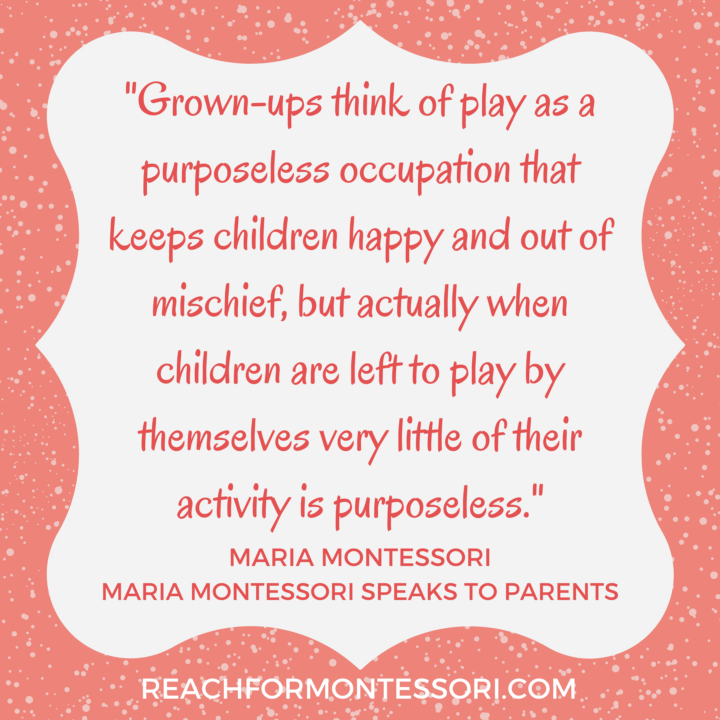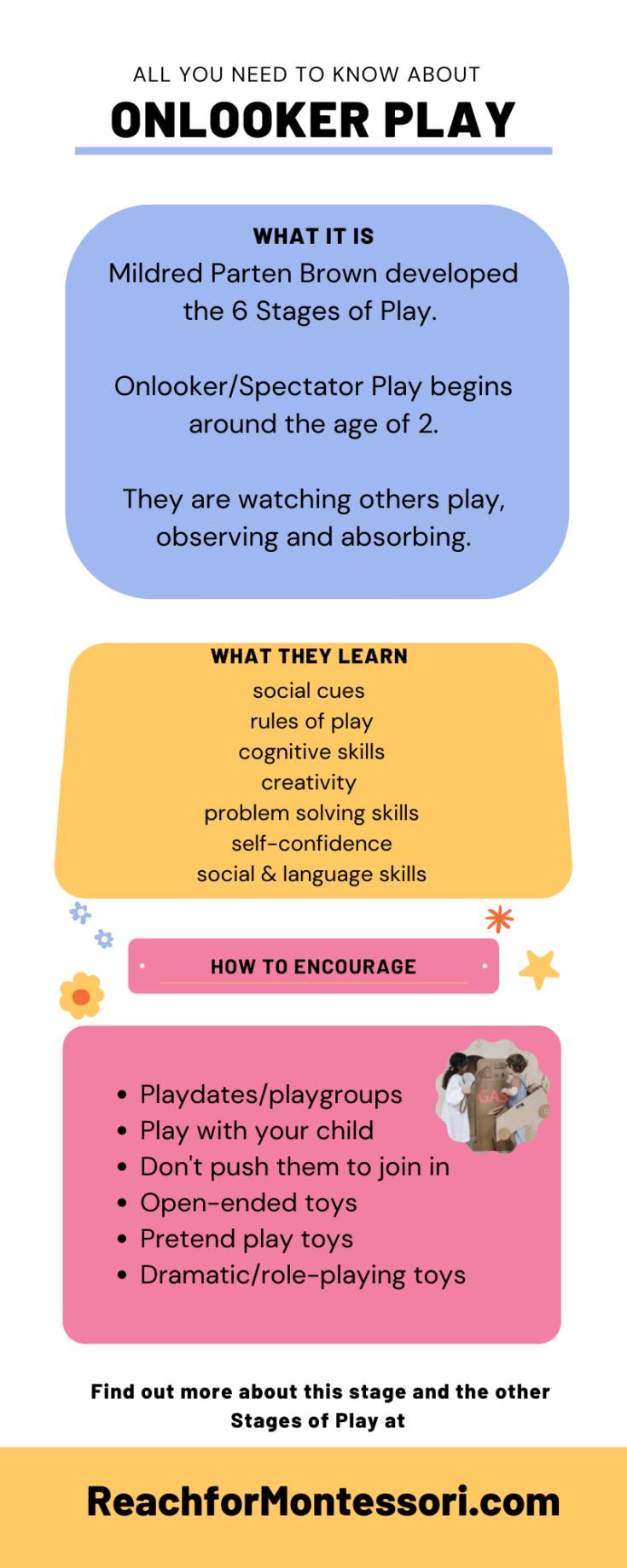All You Need to Know About Onlooker Play — The Montessori-Minded Mom
[ad_1]
In this post, you will find out all about the developmental stage of engage in referred to as Onlooker Participate in. You will discover what it is, at what age it occurs, and you will get some tips on how to assistance this sort of play in your toddler.

(This post incorporates affiliate back links. Purchasing from these backlinks expenses you very little more, but helps with our web site repairs.)
Here at the Montessori-Minded Mother, we have routinely mentioned the relevance of Totally free Participate in. Little one-led perform is essential for any kid, at any stage.
Participate in has connections to improved psychological regulation, artistic pondering, and elevated language and social capabilities. During play, they are studying so substantially much more than we comprehend.

What is Onlooker Participate in?
Onlooker, which is from time to time referred to as Spectator Play, is one of the 6 Phases of Perform designed by sociologist, Dr. Mildred Parten Newhall. The other 5 stages of play are:
Read a lot more about the 6 Levels of Play below.
Onlooker/Spectator participate in ordinarily commences sometime all around the age of 2. All through this phase, they are just observing other kids enjoy. They are observing what the other child(ren) are performing and taking it all in.
The baby will stand at a comfortable distance, in which they can hear the baby(ren). They may request questions, or discuss to the other kid(ren), but will not be a part of in.
Just like through infancy’s unoccupied enjoy, they have a pure want to look at and understand.
Onlooker participate in will normally overlap with the independent participate in phase and may possibly go on as they progress to the future phase.
Illustration:
When my daughter was younger, I took her to the playground the place she watched two more mature preschoolers play “restaurant” at a window-kind opening on the playscape.
She did not want to be part of in, and I highly regarded that. She appreciated watching them from a small distance, smiling and laughing at what they have been executing.
The future time we went to the playground, she made use of the window in the same way, introducing on her possess ideas by using rocks as money.
Now at 3.5 a long time aged, she nonetheless utilizes the window as a cafe and contains her younger sister or other kids.
Why Is Onlooker Participate in Essential?
You may perhaps be inquiring your self: “But do not we want our small children to perform with other kids?” or “What are they acquiring out of just viewing?”
Properly, the truth of the matter is, this phase is a vital milestone, and they are not able to development to the following phases without having 1st creating techniques by way of becoming an onlooker.
During this stage, they are paying interest to anything the other youngsters are performing diverse techniques a baby could possibly be applying a toy, or how young children interact with every single other.
For the duration of this stage they study:
- social cues
- rules of enjoy (I.e., using turns)
- creativity
- social and language skills
- cognitive skills
- self-confidence
- challenge-resolving skills
Occasionally, mom and dad or caregivers imagine the kid is just ”shy” and wants to be pushed to be a part of in. But resist the urge to push the youngster into interacting. They may perhaps be just in this essential phase of becoming a spectator.
I truly feel that it’s really worth mentioning that there is really nothing erroneous with being or experience shy, and it’s vital to respect a child’s boundaries.

How to Support Onlooker Participate in
This stage happens in a natural way but as often, there are means to inspire your child’s development throughout this time.
- Playdates and playgroups. This may well feel pointless if they’re not actively playing collectively, but it provides them new alternatives to be a spectator.
- Trust and assist your youngster. Belief that when they’re prepared, they will participate in with other small childre
n. Respect when they would like to check out and enable them know they can sign up for in when they want to.
- Enjoy with your kid. Even though little ones tend to learn extra from other youngsters for the duration of this phase, you continue to can product actively playing to support them decide on up skills. They will find out social capabilities and cues just by viewing you as effectively.
This doesn’t suggest you have to enjoy with them all day long – we nonetheless want to stimulate independent play.
But if you experience like your child is missing it out on prospects to be an onlooker all through engage in, it doesn’t harm to established apart some time to deliver that your self.
Toys to Aid Onlooker Engage in
Open up-ended toys
Open up-finished toys are toys that can be performed with in a selection of different means, enabling little ones to be resourceful in their play.
Toys that have a person intent or target, like puzzles or Montessori knobbed cylinders, are shut-ended toys.
Examples of open-ended toys:
Examine far more about open-finished toys and a lot more of our strategies in this article.
Faux play
Fake play is imaginative perform utilizing role-play and at times item substitution. It is from time to time called make-believe that or dramatic play.
Illustrations of pretend enjoy toys:
In a examine by Jessica Hoffman and Sandra Russ, it was observed that pretend engage in resulted in greater scores for psychological regulation and divergent considering. Uncover that research here.
Little ones have a pure instinct to play, but also to notice. By supporting this normal instinct, you will start to see how their observations get started to present up in their have independent perform. As properly, you will see how it sales opportunities to the other levels of participate in.
As constantly, it’s critical to don’t forget that each child develops at distinct rates and some little ones could consider a minimal longer to get to this phase.
Nevertheless, if you have any fears regarding their reluctance to join in, or if they never feel to be achieving this stage, it doesn’t harm to mention it to your pediatrician.
[ad_2]
Source backlink
